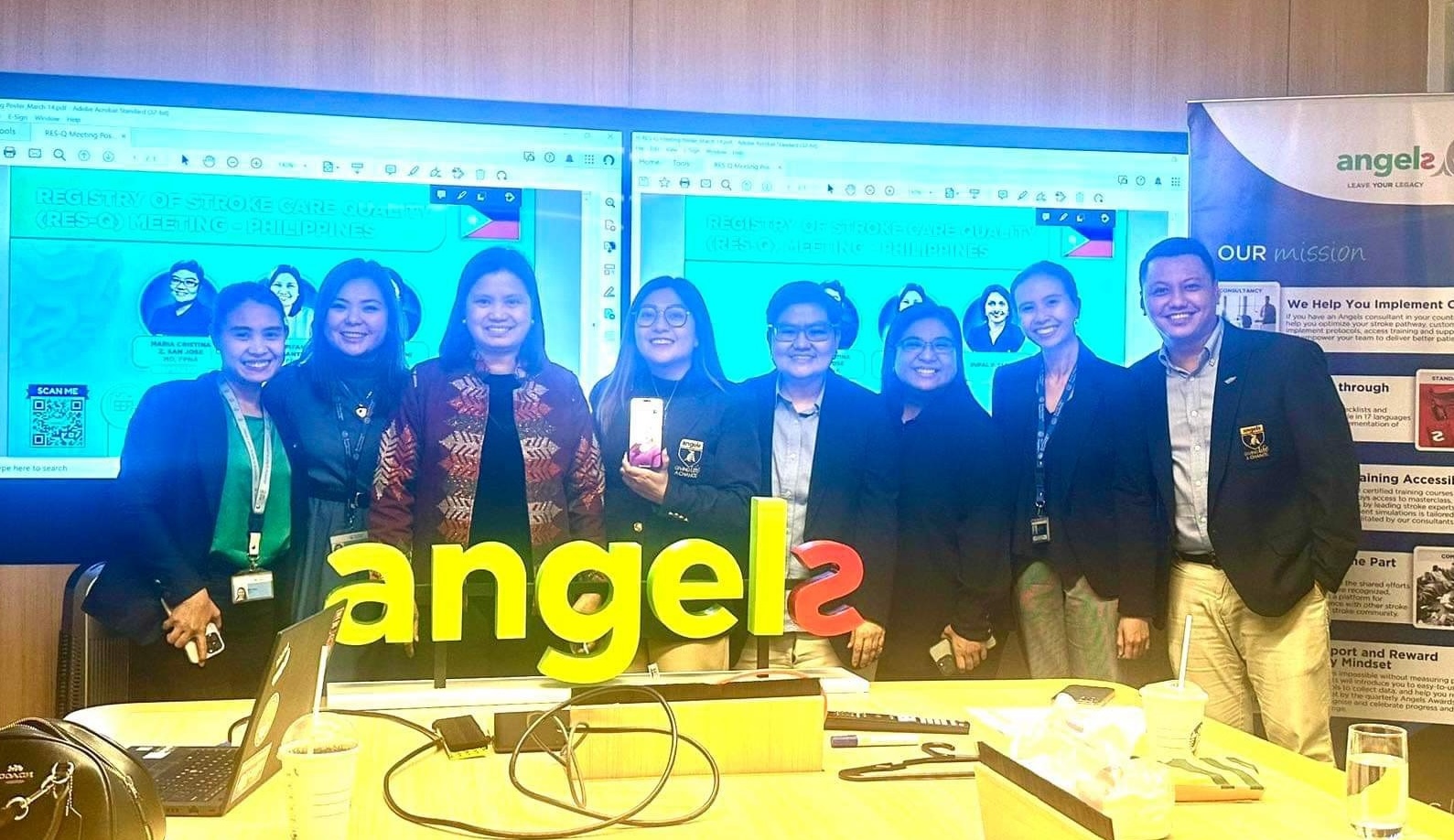
ในเดือนมกราคม 2024 ฐานข้อมูลปรับปรุงคุณภาพโรคหลอดเลือดสมอง RES-Q มีเรื่องราวให้เล่า ฐานข้อมูลนี้กําลังจะเปิดตัวแพลตฟอร์มใหม่ในอนาคตที่พร้อมสําหรับอนาคตที่ที่อยู่เว็บไซต์ใหม่ แพลตฟอร์มใหม่มีคุณสมบัติใหม่ที่น่าสนใจหลายประการซึ่งก่อนหน้านี้ขาดความสามารถ ซึ่งรวมถึงฟังก์ชันการลงชื่อเข้าใช้เดียวเพื่อเข้าถึงบัญชีหลายบัญชี การรวบรวมข้อมูลที่ง่ายขึ้นใน 15 ภาษา แดชบอร์ดที่ใช้งานง่าย และความสามารถในการสร้างรายงานตามความต้องการ
มีการเปิดตัวแคมเปญเพื่อทําให้ชุมชนโรคหลอดเลือดสมองทั่วโลกตระหนักถึง URL ใหม่ และทําให้พวกเขามั่นใจว่าการย้ายข้อมูลเก่าของพวกเขาจะเริ่มขึ้นทันทีที่พวกเขาได้ลงทะเบียนใหม่บนเว็บไซต์ใหม่
แม้ว่าที่ปรึกษา Angels ทั่วโลกจะก้าวขึ้นมาช่วยโรงพยาบาลในประเทศของพวกเขาจัดการกับการเปลี่ยนแปลง แต่ทีมในฟิลิปปินส์ก็มองเห็นโอกาส ประมาณแปดเดือนผ่านไปนับตั้งแต่การประชุมครั้งสําคัญใน Manilla ในระหว่างที่โรงพยาบาลที่พร้อมโรคหลอดเลือดสมองได้รับการฝึกอบรมโดยตรงเกี่ยวกับวิธีการและเหตุผลในการใช้ RES-Q
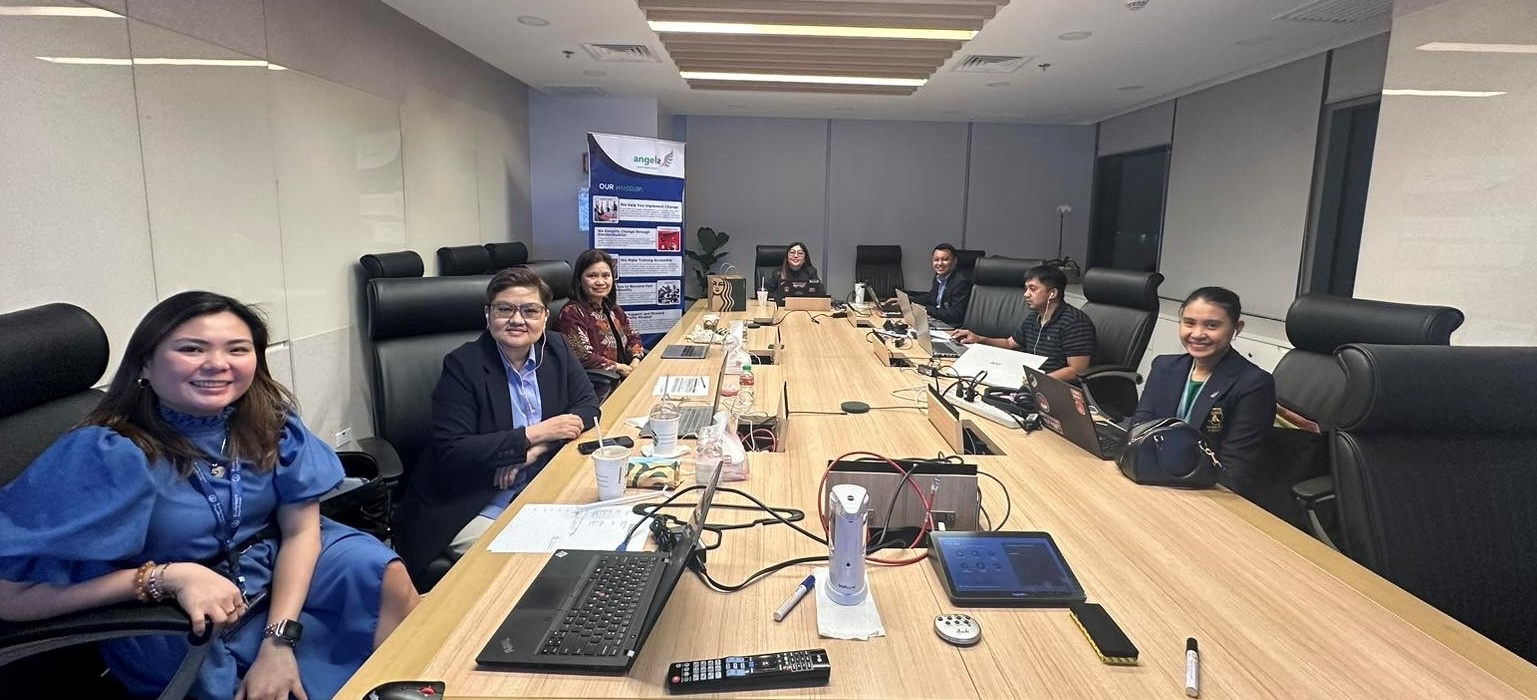
การตรวจสอบคุณภาพเป็นข้อกําหนดสําหรับโปรแกรมการรับรองโรงพยาบาลพร้อมโรคหลอดเลือดสมองเฉียบพลัน (ASRH) ที่สมาคมโรคหลอดเลือดสมองแห่งฟิลิปปินส์ (SSP) เปิดตัวในช่วงต้นปี 2023 เป้าหมายของการประชุม Manilla คือการเปลี่ยนการรับรู้เกี่ยวกับกระบวนการเก็บรวบรวมข้อมูล และด้วยการรวมผู้เชี่ยวชาญด้านโรคหลอดเลือดสมองจากโรงพยาบาลที่ได้รับการรับรอง ASRH จํานวน 47 แห่งเข้าด้วยกันในเหตุการณ์เดียว พวกเขาประสบความสําเร็จในการจุดเทียนจํานวนมากด้วยเปลวไฟเพียงจุดเดียว
ตอนนี้การเปิดตัว RES-Q “ใหม่” ได้นําเสนอโอกาสอีกครั้งสําหรับการพบปะกันที่เน้นการติดตามคุณภาพ ซึ่งครั้งนี้จัดขึ้นทางออนไลน์เพื่อการเข้าถึงโรงพยาบาลได้มากขึ้น
การสัมมนาผ่านเว็บที่จัดขึ้นในตอนเย็นของวันที่ 14 มีนาคม ได้ดึงดูดผู้เข้าร่วมกว่า 300 คนจากโรงพยาบาล 75 แห่ง และได้แสดงให้เห็นถึงการทํางานร่วมกันระหว่าง Angels และ SSP อีกครั้ง การประชุมนี้ได้รับการจัดการโดยประธาน SSP สองท่านที่ผ่านมา ซึ่งปัจจุบันได้แบ่งปันบทบาทของผู้ประสานงานระดับประเทศสําหรับ RES-Q, Drs Maria Epifania Collantes และ Maria Cristina San Jose พร้อมแถลงการณ์ปิดโดยดร. Maria Socorro Sarfati ประธาน SSP คนปัจจุบัน กิจกรรมหลักคือการเดินสํารวจแพลตฟอร์ม RES-Q ใหม่แบบเสมือนจริงที่ดําเนินการโดย Rupal Sedani ผู้จัดการระดับโลกของ RES-Q ที่เชื่อมต่อจากสาธารณรัฐเช็ก
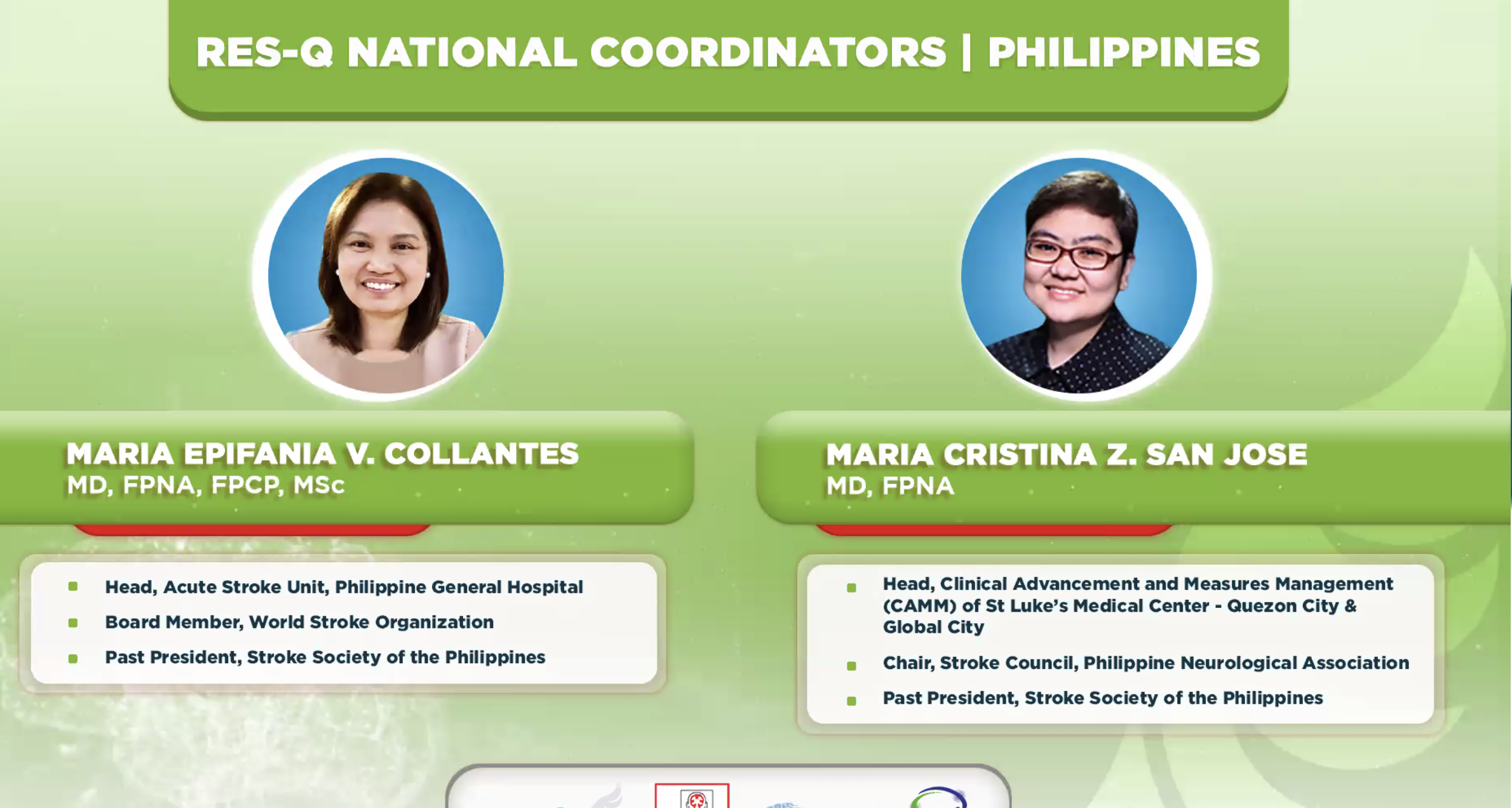
ทําไมต้องมีการติดตามคุณภาพ
การนํา RES-Q มาใช้เนื่องจากฐานข้อมูลแห่งชาติเป็นโอกาสในการปรับปรุงการดูแลผู้ป่วยโรคหลอดเลือดสมองตั้งแต่เริ่มต้น ดร. Collantes กล่าว การเก็บรวบรวมและการวิเคราะห์ข้อมูลก่อให้เกิดประโยชน์ทั้งในด้านการดูแลผู้ป่วยและในส่วนที่เกี่ยวกับการเปลี่ยนแปลงนโยบาย เช่นเดียวกับการระบุช่องว่างและความท้าทายในระดับโรงพยาบาล การติดตามคุณภาพอาจส่งผลกระทบต่อนโยบายโดยการให้ข้อมูลเกี่ยวกับปัจจัยเสี่ยงและให้ความสําคัญกับปัญหาต่าง ๆ เช่น ความแตกต่างทางเพศและความแตกต่างทางสังคมและเศรษฐกิจและภูมิภาค ซึ่งสามารถช่วยเปิดเผยสาเหตุของความล่าช้าในการรักษา ปรับปรุงกําหนดเวลาและผลลัพธ์ในโรคหลอดเลือดสมอง กําหนดแนวโน้มและนําไปสู่การเสียชีวิตที่ลดลงในที่สุด
อย่างไรก็ตาม จําเป็นต้องมีข้อมูลที่ครบถ้วนและถูกต้องเพื่อให้ได้ภาพที่ชัดเจนของการดูแลผู้ป่วยโรคหลอดเลือดสมองทั้งประเทศ
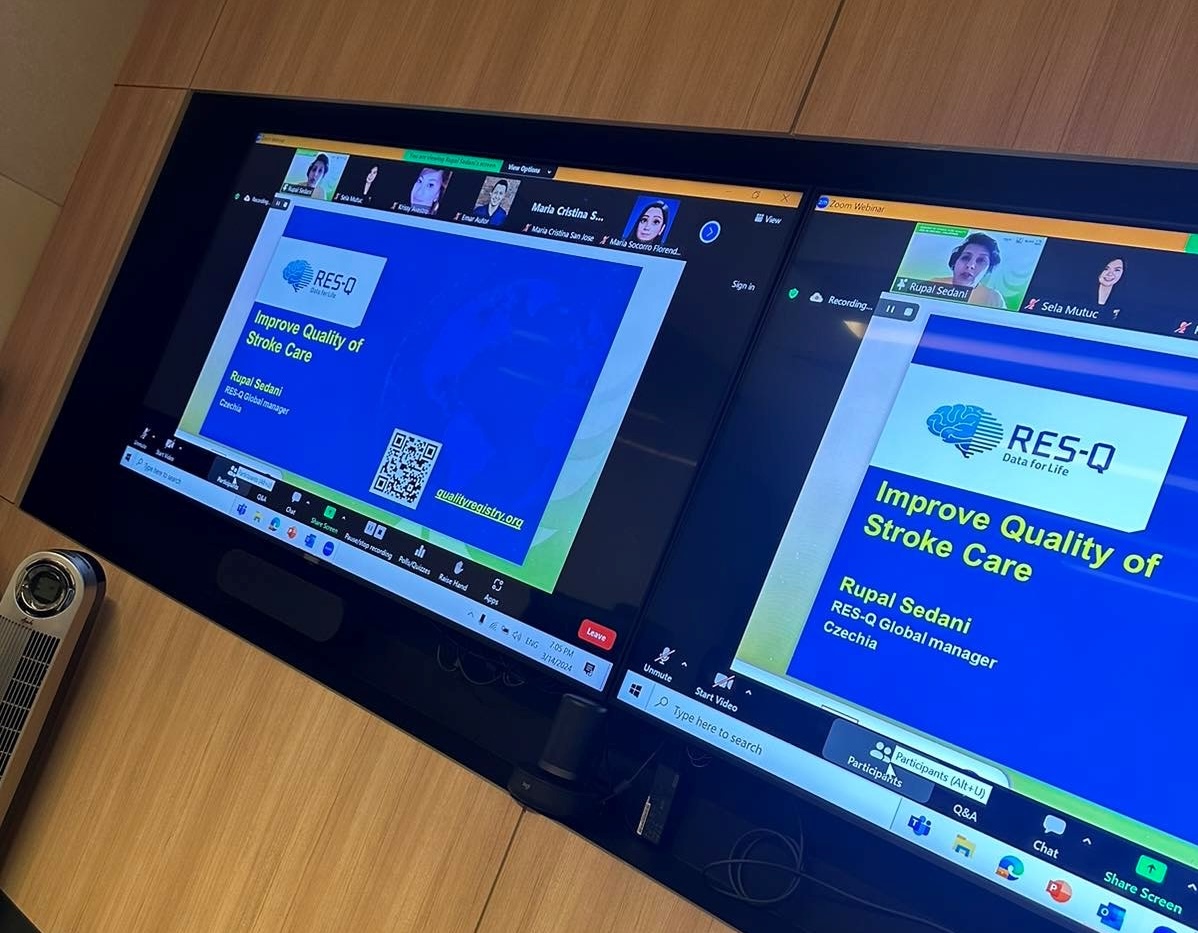
ดร. ซานโฮเซกล่าวว่า การใช้ RES-Q เป็นวิทยากรหลักในการปรับปรุงการดูแลสุขภาพและคุณภาพบนพื้นฐานของหลักฐานในฟิลิปปินส์ การตรวจติดตามคุณภาพเป็นหนึ่งในกลยุทธ์หลักในการส่งเสริมและปลูกฝังการดูแลสุขภาพที่อิงหลักฐาน ซึ่งหมายความว่าระบบการจัดส่งการดูแลสุขภาพทั้งหมดมีรากฐานมาจากหลักการอิงหลักฐาน
การตรวจสอบคุณภาพช่วยให้มีการตรวจสอบการดูแลอย่างเป็นระบบโดยเทียบกับเกณฑ์ที่ชัดเจน ดร. San Jose กล่าว ข้อมูลทั้งผลักดันและดึงการปรับปรุงคุณภาพโดยช่วยระบุและวิเคราะห์ปัญหา ข้อมูลที่ได้รับเป็นพื้นฐานสําหรับการตัดสินใจและนําไปสู่การดําเนินการ
นอกจากนี้ การรวบรวมข้อมูลยังอนุญาตให้มีการเปรียบเทียบสมรรถนะ และการเปรียบเทียบผลลัพธ์และกระบวนการกับของคู่แข่งและผู้นําอุตสาหกรรมได้กระตุ้นแรงขับเคลื่อนที่จะทําให้ดีขึ้น
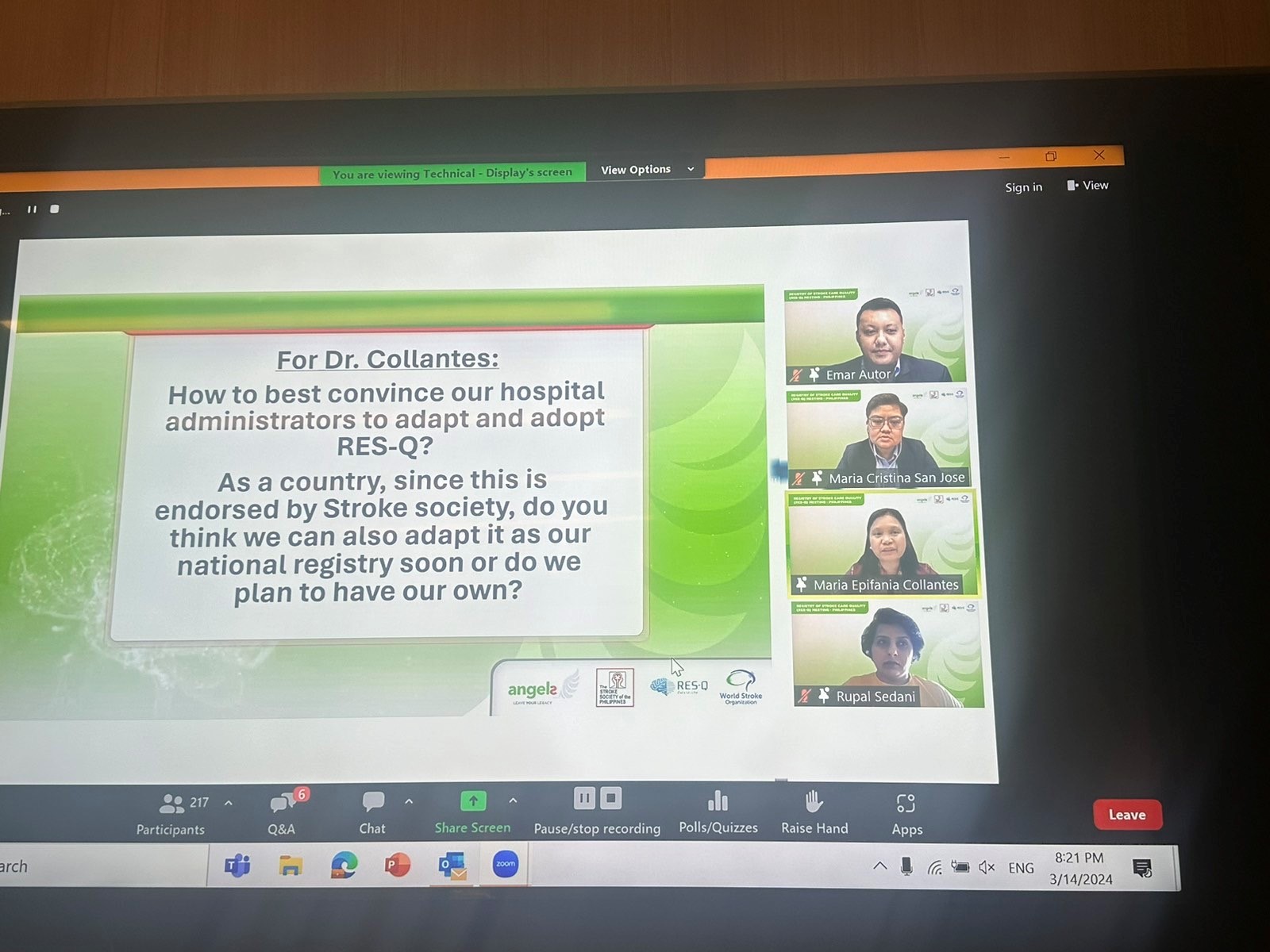
ทําให้เป็นนิสัย
ช่วงเวลาของคําถามหลังจากทัวร์เสมือนจริงของแพลตฟอร์ม RES-Q ที่ปรับปรุงและใช้งานง่ายนํามาซึ่งข้อมูลเชิงลึกเพิ่มเติม:
คําถาม: เราควรโน้มน้าวผู้ดูแลระบบของโรงพยาบาลให้ใช้ RES-Q อย่างไร
ดร. คอลลาเตส: บอกพวกเขาเกี่ยวกับประโยชน์และแสดงให้พวกเขาเห็นว่าสามารถใช้ข้อมูลเพื่อปรับปรุงการดูแลผู้ป่วยโรคหลอดเลือดสมองได้อย่างไร
คําถาม: ฟิลิปปินส์จะมีฐานข้อมูลของตนเองหรือไม่
ดร. คอลลาเตส: RES-Q คือฐานข้อมูลโรคหลอดเลือดสมองแห่งชาติของเรา ได้รับการยอมรับในระดับสากลและให้ข้อเสนอแนะแบบเรียลไทม์ที่ช่วยให้สามารถปรับปรุงได้
คําถาม: ใครควรรับผิดชอบ RES-Q ที่โรงพยาบาลของเรา
ดร. ซานโฮเซ: ระบุผู้นําการเปลี่ยนแปลงของคุณ - คนที่มุ่งมั่นที่จะใช้ข้อมูลเพื่อปรับปรุงคุณภาพ
คําถาม: แนวทางปฏิบัติที่ดีที่สุดในการรายงานและการสื่อสารผลการติดตามคุณภาพในแผนกหรือโรงพยาบาลของคุณคืออะไร
คําตอบสําหรับคําถามนี้เป็นหัวใจสําคัญของความหมายของความมุ่งมั่นในการปรับปรุงคุณภาพอย่างต่อเนื่องและผลลัพธ์ที่ดีขึ้นสําหรับผู้ป่วย ยาวเพียงสี่คํามันมีคําแนะนําหนึ่งข้อที่หากโรงพยาบาลนําขึ้นเครื่องจะทําให้การเปิดใช้งานการติดตามคุณภาพใด ๆ รวมถึงการสัมมนาผ่านเว็บนี้ประสบความสําเร็จ
คุณหมอซานโฮเซ่ไม่ลังเลที่จะรอสักครู่: "ทําให้เป็นนิสัย" เธอกล่าว


